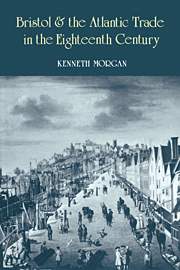Book contents
4 - The export trade
Published online by Cambridge University Press: 12 October 2009
Summary
On outward transatlantic voyages the holds of Bristol vessels were laden with an infinite variety of export wares. These cargoes became an increasingly significant feature of overseas commerce, for English domestic exports quadrupled in value and increasingly found transatlantic markets during the eighteenth century. North America and the West Indies received 11 per cent of English exports in 1700–1 and 16 per cent in 1750–1; they then took 38 per cent of British exports in 1772–3 and 57 per cent in 1797–8. The burgeoning American market for English exports mainly stemmed from rising demand for finished manufactured wares (mainly dry goods and hardware) rather than for crude raw materials and foodstuffs (which were produced either in individual colonies or imported coastwise by one colony from another). In the quarter century before the American Revolution, the range of exports widened to include not only textiles – the major component of export cargoes for centuries – but a variety of manufactures that were probably concentrated at the top and bottom ends of the price range. By 1770 about half of all English exports of ironware, copperware, earthenware, glassware, window glass, printed cotton and linen goods, silk goods and flannels were sent to the colonies plus two-thirds or more of all exports of cordage, sailcloth, iron nails, beaver hats, wrought leather, linen, and Spanish cloth woollen goods. After 1783 textiles renewed their dominance in export cargoes: by 1801 cottons and woollens comprised some 39 per cent of total exports to American markets and 56 per cent of British exports as a whole.
- Type
- Chapter
- Information
- Bristol and the Atlantic Trade in the Eighteenth Century , pp. 89 - 127Publisher: Cambridge University PressPrint publication year: 1993



